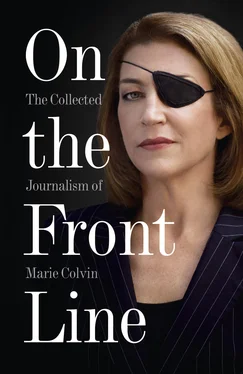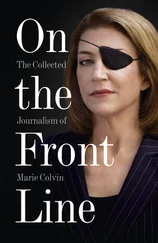Yahia’s story is fascinating, not just as the tale of a man pushed to unbelievable psychological limits, but also because it gives a remarkable insight into the most secretive of worlds, the life of Saddam Hussein and his family.
Now in Vienna as a political exile, the 30-year-old refugee is trying to recover his lost identity. It is disconcerting to meet him. He still looks exactly like Uday, still dresses in the same sharp European suits the dictator’s son favours, sports the same heavy gold jewellery and black Ray-Ban sunglasses. He smokes a Cuban cigar with the same motions and has the same beard that distinguishes Uday from other Iraqis, who have only moustaches.
He is soft-spoken and polite, but old habits die hard. Taking out a cigar, he holds it until somebody lights it, even though the retainers that swarmed around him in his old role as Uday are long gone. He has, however, stopped beating his wife: the violent streak he picked up from his double now sickens him.
Yahia wants to destroy Uday, but he has not changed his appearance because he has no other identity, a dilemma that would have fascinated Sigmund Freud, who lived in the same Vienna street where Yahia’s hideout is.
Yahia’s case is like none Freud ever came across. He grew up in Baghdad, the son of a wealthy Kurdish merchant, and attended the exclusive Baghdad High School for Boys. Uday was in the same class and the two boys resembled each other. ‘But I did not welcome looking similar,’ he said. ‘Uday had very bad manners with people even then.’
After graduating from Baghdad University in 1986 with a law degree, he went off to fight in the Iran–Iraq war, like most young Iraqi males. He was a first lieutenant serving in a forward reconnaissance unit in September 1987 when he received a presidential order to report to Baghdad.
Uday welcomed him in an ornate salon in the presidential palace. There was chit-chat about their schooldays and polite questions about his family before Uday came to the point. ‘Do you want to be a son of Saddam?’ he asked. Wary, Yahia answered: ‘We are all sons of Saddam.’
‘Well, I would like you to be a real son of Saddam, working with me. I don’t want you as protection but as my double.’
Yahia recalled: ‘I was afraid. I knew this was a government of criminals. So I asked him what would happen if I agreed, and what would happen if I refused. Uday told me that if I agreed, “all that you dream will happen”. He said I would have money, servants, houses, women. If I refused, he said, “We will remain friends”.’
Uday left him alone, desperately trying to think up an excuse. When he returned, Yahia had formulated what he thought was a diplomatic way out. ‘All Iraqis want to serve the president,’ he said. ‘I am serving my president as a soldier and I would not like to be more than that.’
Uday’s eyes reddened in rage; he tore the military epaulettes from Yahia’s shoulders and called in security officers. Yahia was blindfolded, driven for an hour in a car (later he would realise he had only been driven around the presidential grounds), and imprisoned in a tiny cell that was painted entirely blood-red.
‘I suffered every kind of torture,’ Yahia recalled. He said he was beaten with a cable, hanged from the ceiling by his hands, fed only bread or rice and water at different times of day so that he would become disorientated. He was told that if he continued to refuse, he would spend the rest of his life in the cell. After a week, he cracked.
Four days later he signed papers promising he would act as Uday’s double and reveal nothing about his activities. The contract ended with a warning: any violation and the penalty was death by hanging. Two weeks later, surgery began at the Ibn Sina hospital in the palace complex. Dentists removed his front teeth and replaced them with teeth like Uday’s; doctors cut a cleft into his chin.
‘I hated myself,’ he said. ‘All my family and friends hated Saddam; so looking like his son, I was disgusted with myself.’
He began his ‘special education’: 16 hours a day watching videos of Uday walk, dance, drive, talk, get in and out of cars, light cigars, drink Scotch. A trainer would then take him through each movement over and over 20, 30, 40 times, day after day until he got it right.
‘I never drank before, or smoked, or danced. I was very correct with people,’ Yahia said. ‘I had to learn to drink Dimple (Uday’s brand of whisky), smoke cigars and talk differently. And I had to learn to be rude with people, like him.’ He also learned intelligence and sabotage techniques, and was taught to check under cars before getting into them.
After six months of intensive training, Yahia made his first public appearance as his double at a football match at the People’s Stadium, where he was surrounded by people who knew the president’s son. With a trainer by his elbow every moment, even driving the black Mercedes 500SL that was Uday’s favourite car, Yahia passed muster. He remembers thinking when he arrived back at the sumptuous villa Uday had given him: ‘Latif Yahia doesn’t exist any more.’
Four lost years followed. Yahia appeared as Uday and travelled with him to London, Geneva and Paris. Whenever Uday wanted a suit – he preferred Christian Dior and Yves St Laurent – he bought two: one for himself, one for Yahia. Uday owned more than 100 luxury cars, and selected them daily to match the colour of his suit.
Outside Baghdad, Yahia would travel in a security convoy as Uday, sometimes with as many as 72 bodyguards. By the time of the Gulf War, Saddam had so much confidence in Yahia that he used him in a cruel confidence trick against his own people. Every Iraqi remembers the visit by Uday to troops on the Kuwaiti front; in fact it was Yahia, sent there with a television crew to counteract truthful reports that Saddam’s family had fled to safety outside Iraq.
During the years of their ‘partnership’, Uday gave him only one rule: ‘Don’t touch my girls.’ At one point, Uday sent him to prison for 21 days because a girlfriend of Uday’s became angry with Yahia, and told the president’s son that he had tried to seduce her. When he was released, his double gave him a Mercedes by way of apology.
Uday often beat his guards, so in public Yahia would have to do the same. He had to learn to curse people; now, in an embarrassed voice, he repeats Uday’s favourites. ‘I would have to say “Your mother is a whore” and things like that,’ Yahia said.
Gradually his public life merged with his private; he is ashamed to admit that he began to beat his wife, Bushra. ‘I would kill Uday if I saw him again,’ Yahia said. ‘I would cut his body into small pieces and feed it to dogs. He made out of me a criminal like himself.’
Yahia was at a party on the river Tigris given for Suzanne Mubarak, the wife of the Egyptian president, when Uday committed one of his worst outrages. Uday hated Kamel Hanna, his father’s favourite retainer, for serving as the go-between for Saddam’s mistress, Samira Shahbandar, wife of the president of Iraq Airways. When Hanna failed to invite Uday to the Mubarak reception, he threw a party nearby out of spite; hearing shots at midnight, he crashed drunkenly into Hanna’s celebration.
Uday saw Hanna firing into the air, Yahia recalled, and ordered him to stop shooting. ‘I only take orders from the president,’ Hanna replied. The night degenerated into violent chaos. Uday cut Hanna’s neck and beat him, then downed pills at the thought of his father’s anger. Both were taken to hospital, where Uday met Saddam waiting for word of his aide.
‘Saddam grabbed Uday by the shirt and said: “If Kamel dies, you die”,’ Yahia said. Hanna died that night, but Uday’s mother intervened to save her son. Yahia worried that he would be executed instead of Uday, but there had been too many witnesses.
Читать дальше












